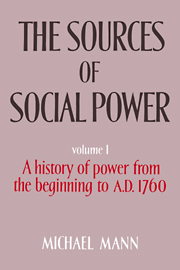Book contents
- Frontmatter
- Contents
- Preface
- 1 Societies as organized power networks
- 2 The end of general social evolution: how prehistoric peoples evaded power
- 3 The emergence of stratification, states, and multi-power-actor civilization in Mesopotamia
- 4 A comparative analysis of the emergence of stratification, states, and multi-power-actor civilizations
- 5 The first empires of domination: the dialectics of compulsory cooperation
- 6 “Indo-Europeans” and iron: expanding, diversified power networks
- 7 Phoenicians and Greeks: decentralized multi-power-actor civilizations
- 8 Revitalized empires of domination: Assyria and Persia
- 9 The Roman territorial empire
- 10 Ideology transcendent: the Christian ecumene
- 11 A comparative excursus into the world religions: Confucianism, Islam, and (especially) Hindu caste
- 12 The European dynamic: I. The intensive phase, A.D. 800–1155
- 13 The European dynamic: II. The rise of coordinating states, 1155–1477
- 14 The European dynamic: III. International capitalism and organic national states, 1477–1760
- 15 European conclusions: explaining European dynamism – capitalism, Christendom, and states
- 16 Patterns of world-historical development in agrarian societies
- Index
10 - Ideology transcendent: the Christian ecumene
Published online by Cambridge University Press: 26 December 2009
- Frontmatter
- Contents
- Preface
- 1 Societies as organized power networks
- 2 The end of general social evolution: how prehistoric peoples evaded power
- 3 The emergence of stratification, states, and multi-power-actor civilization in Mesopotamia
- 4 A comparative analysis of the emergence of stratification, states, and multi-power-actor civilizations
- 5 The first empires of domination: the dialectics of compulsory cooperation
- 6 “Indo-Europeans” and iron: expanding, diversified power networks
- 7 Phoenicians and Greeks: decentralized multi-power-actor civilizations
- 8 Revitalized empires of domination: Assyria and Persia
- 9 The Roman territorial empire
- 10 Ideology transcendent: the Christian ecumene
- 11 A comparative excursus into the world religions: Confucianism, Islam, and (especially) Hindu caste
- 12 The European dynamic: I. The intensive phase, A.D. 800–1155
- 13 The European dynamic: II. The rise of coordinating states, 1155–1477
- 14 The European dynamic: III. International capitalism and organic national states, 1477–1760
- 15 European conclusions: explaining European dynamism – capitalism, Christendom, and states
- 16 Patterns of world-historical development in agrarian societies
- Index
Summary
Introduction
In previous chapters we glimpsed both ideological power configurations identified in Chapter 1. In the examples of the Assyrian and Persian empires we saw ideology as immanence and as morale, that is, as the solidification of states and ruling classes through the infrastructures of ideological power – communications, education, and life-style. This was predominantly an oral rather than a literate infrastructure. Earlier, in the first emergence of civilization, we saw ideology as transcendent power, that is, as power that cut right across existing economic, military, and political power networks, legitimating itself with divine authority but nonetheless answering real social needs. However, in these cases the surviving evidence was somewhat fragmentary. In later history, with better evidence, we can observe such processes fairly clearly.
This chapter presents evidence of a “competition” between the two configurations of ideological power in the later Roman Empire. On the one hand, ideology solidified the immanent morale of the Roman ruling class. But, on the other, it appeared as the transcendent power of Christianity – what I shall call the Christian ecumene. This was innovative, combining extensive and intensive power, largely of a diffuse rather than an authoritative kind, which spread throughout all the major classes of an extensive society. Such transcendence of class, partial though it was, was world-historical in its influence. Both configurations of ideological power answered real social needs, both depended critically on their own infrastructures of power. After a period of conflict, they effected a partial compromise that endured (just) through the Dark Ages to provide an essential part of that later European dynamism described in Chapter 12.
- Type
- Chapter
- Information
- The Sources of Social Power , pp. 301 - 340Publisher: Cambridge University PressPrint publication year: 1986



